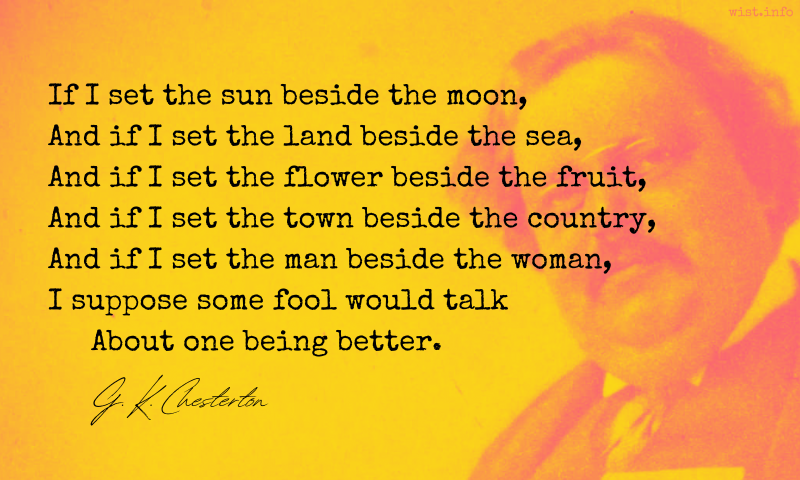Yet it is certain, likewise, that many of our miseries are merely comparative: we are often made unhappy, not by the presence of any real evil, but by the absence of some fictitious good; of something which is not required by any real want of nature, which has not in itself any power of gratification, and which neither reason nor fancy would have prompted us to wish, did we not see it in the possession of others.
Samuel Johnson (1709-1784) English writer, lexicographer, critic
Essay (1753-11-27), The Adventurer, No. 111
(Source)
Quotations about:
comparison
Note not all quotations have been tagged, so Search may find additional quotes on this topic.
CALVIN: I wonder why people are never content with what they have.
HOBBES: Are you kidding? Your fingernails are a joke, you’ve got no fangs, you can’t see at night, your pink hides are ridiculous, your reflexes are nil, and you don’t even have tails! Of course people aren’t content!
CALVIN: Forget I said anything.
HOBBES: Now if tigers weren’t content, that would be something to wonder about.
Men have always detested women’s gossip because they suspect the truth: their measurements are being taken and compared.
BOLINGBROKE: O, who can hold a fire in his hand
By thinking on the frosty Caucasus?
Or cloy the hungry edge of appetite
By bare imagination of a feast?
Or wallow naked in December snow
By thinking on fantastic summer’s heat?
O no, the apprehension of the good
Gives but the greater feeling to the worse.
Fell sorrow’s tooth doth never rankle more
Than when he bites but lanceth not the sore.William Shakespeare (1564-1616) English dramatist and poet
Richard II, Act 1, sc. 3, l. 301ff (1.3.301-310) (1595)
(Source)
The man who has double my salary is doubtless tortured by the thought that someone else in turn has twice as much as he has, and so it goes on. If you desire glory, you may envy Napoleon. But Napoleon envied Caesar, Caesar envied Alexander, and Alexander, I daresay, envied Hercules, who never existed. You cannot, therefore, get away from envy by means of success alone, for there will always be in history or legend some person even more successful than you are. You can get away from envy by enjoying the pleasures that come your way, by doing the work that you have to do, and by avoiding comparisons with those whom you imagine, perhaps quite falsely, to be more fortunate than yourself
Bertrand Russell (1872-1970) English mathematician and philosopher
Conquest of Happiness, Part 1, ch. 6 “Envy” (1930)
(Source)
Merely to realize the causes of one’s own envious feelings is to take a long step towards curing them. The habit of thinking in terms of comparison is a fatal one.
The truth is, the person who pretends to advise, does, in that particular, exercise a superiority over us, and can have no other reason for it, but that, in comparing us with himself, he thinks us defective either in our conduct or our understanding. For these reasons, there is nothing so difficult as the art of making advice agreeable; and indeed all the writers, both ancient and modern, have distinguished themselves among one another, according to the perfection at which they have arrived in this art.
Joseph Addison (1672-1719) English essayist, poet, statesman
Essay (1712-10-17), The Spectator, No. 512
(Source)
What people mean, therefore, by the struggle for life is really the struggle for success. What people fear when they engage in the struggle is not that they will fail to get their breakfast next morning, but that they will fail to outshine their neighbours.
Bertrand Russell (1872-1970) English mathematician and philosopher
Conquest of Happiness, Part 1, ch. 3 “Competition” (1930)
(Source)
He that is proud of riches is a fool. For if he be exalted above his Neighbors because he hath more gold, how much inferior is he to a gold Mine! how much is he to give place to a chain of Pearl, or a knot of Diamonds? for certainly that hath the greatest excellence from whence he derives all his gallantry and preeminence over his Neighbours.
Jeremy Taylor (1613-1667) English cleric and author
The Rule and Exercise of Holy Living, ch. 2 “Of Christian Charity,” sec. 4 “Of Humility” (1650)
(Source)
ALCESTE: Esteem is founded on comparison:
To honor all men is to honor none.
[Sur quelque préférence une estime se fonde,
Et c’est n’estimer rien qu’estimer tout le monde.]Molière (1622-1673) French playwright, actor [stage name for Jean-Baptiste Poquelin]
Le Misanthrope, Act 1, sc. 1 (1666) [tr. Wilbur (1954)]
(Source)
(Source (French)). Alternate translations:Preference must be based on esteem, and to esteem every one is to esteem no one.
[tr. Van Laun (1878)]Esteem must be founded on some preference, and to esteem all the world is to esteem no one.
[tr. Mathew (1890)]Esteem is based on preference; to esteem the whole world alike is to feel no esteem for anyone.
[tr. Wormeley (1894)]Preference is based on esteem, and to esteem every one is not to esteem anyone.
[tr. Waller (1903)]Real love must rest upon some preference;
You might as well love none, as everybody.
[tr. Page (1913)]But true esteem is based on preference;
Esteeming everyone, you esteem nothing.
[tr. Bishop (1957)]Esteem, if it be real, means preference,
And when bestowed on all it makes no sense.
[tr. Frame (1967)]On some preference esteem is based; to esteem everything is to esteem nothing.
[E.g. (1968)]
Foolish people, I say, then, who have never experienced much of either, will tell you that mental distress is far more agonizing than bodily. Romantic and touching theory! so comforting to the love-sick young sprig who looks down patronizingly at some poor devil with a white starved face and thinks to himself, “Ah, how happy you are compared with me!” — so soothing to fat old gentlemen who cackle about the superiority of poverty over riches. But it is all nonsense — all cant. An aching head soon makes one forget an aching heart. A broken finger will drive away all recollections of an empty chair. And when a man feels really hungry he does not feel anything else.
Jerome K. Jerome (1859-1927) English writer, humorist [Jerome Klapka Jerome]
Idle Thoughts of an Idle Fellow, “On Eating and Drinking” (1886)
(Source)
There are such things as to speak well, to speak easily, to speak correctly, and to speak seasonably. We offend against the last way of speaking if we mention a sumptuous entertainment we have just been present at before people who have not had enough to eat; if we boast of our good health before invalids; if we talk of our riches, our income, and our fine furniture to a man who has not so much as an income or a dwelling; in a word, if we speak of our prosperity before people who are wretched; such a conversation is too much for them, and the comparison which they then make between their condition and ours is very painful.
[Il y a parler bien, parler aisément, parler juste, parler à propos. C’est pécher contre ce dernier genre que de s’étendre sur un repas magnifique que l’on vient de faire, devant des gens qui sont réduits à épargner leur pain; de dire merveilles de sa santé devant des infirmes; d’entretenir de ses richesses, de ses revenus et de ses ameublements un homme qui n’a ni rentes ni domicile; en un mot, de parler de son bonheur devant des misérables: cette conversation est trop forte pour eux, et la comparaison qu’ils font alors de leur état au vôtre est odieuse.]
Jean de La Bruyère (1645-1696) French essayist, moralist
The Characters [Les Caractères], ch. 5 “Of Society and Conversation [De la Société et de la Conversation],” § 23 (5.23) (1688) [tr. Van Laun (1885)]
(Source)
(Source (French)). Alternate translations:Some men talk well, easily, justly, and to the purpose: those offend in the last kind, who speak of the Banquets they are to be at, before such as are reduc'd to spare their Bread; of sound Limbs, before the Infirm; of Demesnes and Revenues, before the Poor and Needy; of fine Houses and Furniture, before such as have neither Dwelling or Moveables: in a word, who speak of Prosperity, before the Miserable. This conversation is too strong for 'em, and the comparison you make between their condition and yours is odious.
[Bullord ed. (1696)]There is speaking well, speaking easily, speaking justly, and speaking seasonably: 'Tis transgressing the last rule, to speak ofthe sumptuous Entertainments you have made, before such as are reduc'd to want of Bread; of a healthy Constitution of Body, before the Infirm; of Demesnes, Revenues and Furniture, before a Man who has neither Dwelling, Rents, nor Movables; in a word, to speak of your Prosperity before the Miserable: this Conversation is too strong from them, and the Comparison they make between their Condition and yours is odious.
[Curll ed. (1713)]There is speaking well, speaking easily, speaking justly, and speaking seasonably: It is offending against the last, to speak of Entertainments before the Indigent; of sound Limbs and Health before the Infirm; of Houses and Lands before one who has not so much as a Dwelling; in a Word, to speak of your Prosperity before the Miserable; this Conversation is cruel, and the Comparison which naturally rises in them betwixt their Condition and yours is excruciating.
[Browne ed. (1752)]There is a difference between speaking well, speaking easily, speaking with judgement and speaking opportunely. We fail in this last respect when we enlarge upon the splendid meal we have just enjoyed in front of people who have to be thrifty of their bread; or boast of our health in the presence of invalids; or talk about our wealth, our fortune and property to a man who has neither home nor income; in a word, when we speak of our happiness in front of those who are wretched; such conversation is too painful for them, and the comparison they are bound to make between your state and their own is intolerable.
[tr. Stewart (1970)]
LEAR: I am a man
More sinned against than sinning.William Shakespeare (1564-1616) English dramatist and poet
King Lear, Act 3, sc. 2, l. 62ff (3.2.62-63) (1606)
(Source)
This is the tax a man must pay to his virtues, — they hold up a torch to his vices, and render those frailties notorious in him which would have passed without observation in another.
Charles Caleb "C. C." Colton (1780-1832) English cleric, writer, aphorist
Lacon: Or, Many Things in Few Words, Vol. 1, § 237 (1820)
(Source)
If I set the sun beside the moon,
And if I set the land beside the sea,
And if I set the flower beside the fruit,
And if I set the town beside the country,
And if I set the man beside the woman,
I suppose some fool would talk
About one being better.Gilbert Keith Chesterton (1874-1936) English journalist and writer
“Comparisons”
(Source)
In "The Notebook" (1894-98). BL MS Add. 73334, fo. 5.
The poem, which has no formal title, has been printed in multiple forms. In many cases, the third line (flower/fruit) is omitted. In some cases "tower" is substituted for "town."
Remember that there is nothing noble in being superior to some other man. The true nobility is in being superior to your previous self.
W. L. Sheldon (1858-1907) American lecturer, ethicist [Walter Lorenzo Sheldon]
“What to Believe: An Ethical Creed,” Ethical Addresses (Apr 1897)
(Source)
Often incorrectly attributed to Hemingway. More discussion: There Is Nothing Noble in Being Superior to Some Other Man. The True Nobility Is in Being Superior to Your Previous Self – Quote Investigator.
You damn every poem I write,
Yet you won’t publish those of your own.
Now kindly let yours see the light,
Or else leave my damned ones alone.[Cum tua non edas, carpis mea carmina, Laeli.
Carpere vel noli nostra vel ede tua.]Martial (AD c.39-c.103) Spanish Roman poet, satirist, epigrammatist [Marcus Valerius Martialis]
Epigrams [Epigrammata], Book 1, epigram 91 (1.91) (AD 85-86) [tr. Nixon (1911)]
(Source)
"To Lælius". (Source (Latin)). Alternate translations:Thou blam'st my verses and conceal'st thine own:
Or publish thine, or else let mine alone!
[tr. Killigrew (1695)]You do not publish your own verses, Laelius; you criticise mine. Pray cease to criticise mine, or else publish your own.
[tr. Bohn's Classical (1859)]Although you don't publish your own, you carp at my poems, Laelius. Either do not carp at mine, or publish your own.
[tr. Ker (1919)]You blame my verse; to publish you decline;
Show us your own or cease to carp at mine.
[tr. Pott & Wright (1921)]Although you have not published
Even a single line
Of poetry yourself, you scoff
And sneer and jeer at mine.
Get off my back or publish!
I'd like to hear you whine!
[tr. Marcellino (1968)]Although you don't punish anything, Laelius,
you keep finding fault with my songs. So please,
stop criticizing my stuff, or publish your own.
[tr. Bovie (1970)]Although you don't publish your own poems, Laelius, you carp at mine. Either don't carp at mine or publish your own.
[tr. Shackleton Bailey (1993)]Each poem I publish you loudly bemoan.
Unfair that you never share works of your own.
[tr. Ericsson (1995)]You don’t write poems, Laelius, you criticise mine. Stop criticising me or write your own.
[tr. Kline (2006)]With carpings you my works revile.
Your own you never publish.
Without such works, your carpings I'll
Consider snooty rubbish.
[tr. Wills (2007), "The Critic"]You blast my verses, Laelius; yours aren’t shown.
Either don’t carp at mine or show your own.
[tr. McLean (2014)]You won’t reveal your verse,
but whine that mine is worse.
Just leave me alone
or publish your own.
[tr. Juster (2016)]You never wrote a poem,
yet criticize mine?
Stop abusing me or write something fine
of your own!
[tr. Burch (c. 2017)]
Like common law, the moral imagination works by precedent and example. We are all equipped with an inherited archive of historical events that serves as the background for everything that occurs. Especially when we are confronted with new events that test the limits of moral comprehension, we call upon what is most familiar in historical memory to regain our sense of moral orientation. We require this archive not only for political judgment, but as the necessary horizon for human experience.
Peter E, Gordon (b. 1966) American intellectual historian
“Why Historical Analogy Matters,” New York Review of Books (7 Jan 2020)
(Source)
He who knows one, knows none.
Max Müller (1823-1900) German-British philologist, Orientalist, religious studies founder
“The Science of Religion,” Lecture 1, Royal Institution (19 Feb 1870), Lectures on the Science of Religion (1872)
(Source)
Regarding religion, paraphrasing Goethe on language ("He who knows one language, knows none").
We do not judge men by what they are in themselves, but by what they are relatively to us.
Anne Sophie Swetchine (1782-1857) Russian-French author and salonist [Madame Swetchine]
The Writings of Madame Swetchine, “Airelles”, #25 (1869) [ed. Count de Falloux, tr. Preston]
(Source)
Nothing is good or bad but by Comparison.
Thomas Fuller (1654-1734) English physician, preacher, aphorist, writer
Gnomologia: Adages and Proverbs (compiler), # 3666 (1732)
(Source)
It is so pleasant to come across people more stupid than ourselves. We love them at once for being so.
Jerome K. Jerome (1859-1927) English writer, humorist [Jerome Klapka Jerome]
Idle Thoughts of an Idle Fellow, “On Cats and Dogs” (1889)
(Source)
I love to see two truths at the same time. Every good comparison gives the mind this advantage.
[J’aime à voir deux vérités à la fois. Toute bonne comparaison donne à l’esprit cet avantage.]
Joseph Joubert (1754-1824) French moralist, philosopher, essayist, poet
Pensées [Thoughts], Introduction, “L’auteur Peint par Lui-Même [The Author’ Self-Portrait]” (1850 ed.) [tr. Auster (1983)], 1796]
(Source)
(Source (French)). Alternate translations:I like to see two truths at once. Every good comparison gives the mind this advantage.
[tr. Calvert (1866), "Notice"]I like to see two truths at once. Every good comparison gives the mind that advantage.
[tr. Collins (1928)]
Science is like sex: sometimes something useful comes out, but that is not the reason we are doing it.
Richard Feynman (1918-1988) American physicist
(Attributed)
Many variations can be found for this quotation (none of them with citation); the word "Science" and "Physics" are often interchanged:As noted here, Frank Oppenheimer (a colleague of Feynman's) was quoted saying, "There's a lot of practical fruits to understanding, but it's like sex. There are practical fruits to sex, but nobody would say that's why you do it, normally." Feynman and Oppenheimer may well have collaborated on the general phrasing, or taken it from one another.
- "Science is like sex, it has its practical purposes, but that's not why we do it."
- "Science is like sex. Sometimes something useful comes out, but that is not why we are doing it."
- Physics is like sex. Sure, it may give some practical results, but that's not why we do it."
The reason we struggle with insecurity is because we compare our behind-the-scenes with everyone else’s highlight reel.
Steven Furtick (b. 1980) American pastor
Speech, Willow Creek Global Leadership Summit (church gathering) (11 Aug 2011)
Comparison, more than Reality, makes Men happy or wretched.
Thomas Fuller (1654-1734) English physician, preacher, aphorist, writer
Gnomologia: Adages and Proverbs (compiler), # 1133 (1732)
(Source)
In whatsoever Condition thou art, still ask thyself, What would my blessed Savior have thought, said, and done in this Case.
Thomas Fuller (1654-1734) English physician, preacher, aphorist, writer
Introductio ad Prudentiam, Vol. 1, # 693 (1725)
(Source)
"What Would Jesus Do?"
Injustice in this world is not something comparative; the wrong is deep, clear, and absolute in each private fate.
He who is ignorant of foreign languages, knows not his own.
[Wer fremde Sprachen nicht kennt, weiß nichts von seiner eigenen.]
Johann Wolfgang von Goethe (1749-1832) German poet, statesman, scientist
Über Kunst und Alterthum (1821)
(Source)
Alt. trans.:
- "He who knows not foreign languages, knows nothing of his own."
- "No man who knows only his own language knows even that."
- "He who knows but one language knows none."
- "He who knows one language, knows none."
- "A man who has no acquaintance with foreign languages knows nothing of his own." [tr. Bailey Saunders]
Why laugh? Change but the name, and the tale is told of you.
[Quid rides? Mutato nomine de te
fabula narratur.]Horace (65–8 BC) Roman poet, satirist, soldier, politician [Quintus Horatius Flaccus]
Satires [Saturae, Sermones], Book 1, # 1, “Qui fit, Mæcenas,” l. 68ff (1.1.68-69) (35 BC) [tr. Fairclough (Loeb) (1926)]
(Source)
After the Miser scoffs at the story of Tantalus.
Latin sometimes given as "... fabula de te narratur."
(Source (Latin)). Alternate translations:Takynge but his name,
This tale maye well be toulde of the, thou arte the veray same.
[tr. Drant (1567)]Do you but change the name
Of you is saide the same.
[tr. Florio (1603): Montaigne, Essays, Preface]Why laughst thou Miser? if thy name should be
A little chang'd, the Fables told of thee.
[tr. A. B.; ed. Brome (1666)]What dost Thou laugh? and think that Thou art
Fool change the Name, the Story's told of Thee.
[tr. Creech (1684)]Wherefore do you laugh?
Change but the name, of thee the tale is told.
[tr. Francis (1747)]You smile, as if the story were not true!
Change but the name, and it applies to you.
[tr. Howes (1845)]Why do you laugh? The name changed, the tale is told of you.
[tr. Smart/Buckley (1853)]Well, why that laugh? but change the name, and the then the story's told of you.
[tr. Millington (1870)]Laughing, are you? why?
Change but the name, of you the tale is told.
[tr. Conington (1874)]You laugh? Well, just change the name and you'll find that this story,
as a matter of fact, means YOU.
[tr. Palmer Bovie (1959)]What's so funny? Change the name and it's you
the myth's about.
[tr. Fuchs (1977)]You laugh? Change
The name, and it's your story too!
[tr. Raffel (1983)]Why laugh? Change the name of the fable
and it applies to you.
[tr. Alexander (1999)]What are you laughing at? Just change the name and the joke's on you.
[Source (2002)]You laugh? Change but
the names and this old story's about you.
[tr. Matthews (2002)]What are you laughing at? Change the name and you're the subject
of the story.
[tr. Rudd (2005 ed.)]Why do you mock him? Alter a name and the same tale
Is told of you.
[tr. Kline (2015)]
I grant I never saw a goddess go:
My mistress when she walks treads on the ground.
And yet, by heaven, I think my love as rare
As any she belie with false compare.
You should each judge your own conduct. If it is good, then you can be proud of what you yourself have done, without having to compare it with what someone else has done. For each of you have to carry your own load.
[Τὸ δὲ ἔργον ἑαυτοῦ δοκιμαζέτω ἕκαστος καὶ τότε εἰς ἑαυτὸν μόνον τὸ καύχημα ἕξει καὶ οὐκ εἰς τὸν ἕτερον. ἕκαστος γὰρ τὸ ἴδιον φορτίον βαστάσει.]
The Bible (The New Testament) (AD 1st - 2nd C) Christian sacred scripture
Galatians 6: 4-5 [GNT (1976)]
(Source)
(Source (Greek)). Alternate translations:But let every man prove his own work, and then shall he have rejoicing in himself alone, and not in another.
For every man shall bear his own burden.
[KJV (1611)]Let each of you examine his own conduct; if you find anything to boast about, it will at least be something of your own, not just something better than your neighbour has. Everyone has his own burden to carry.
[JB (1966)]But everyone is to examine his own achievements, and then he will confine his boasting to his own achievements, not comparing them with anybody else's. Each one has his own load to carry.
[NJB (1985)]Each person should test their own work and be happy with doing a good job and not compare themselves with others. Each person will have to carry their own load.
[CEB (2011)]All must test their own work; then that work, rather than their neighbor’s work, will become a cause for pride. For all must carry their own loads.
[NRSV (2021 ed.)]
































